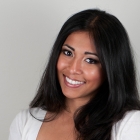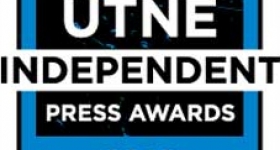Rasha Mubarak shows off Emerge's election voter guide
The 2012 election was a victory for Muslim Americans in the sense that 85 percent of Muslims voted for the winner, President Barack Obama. However, this election also revealed that although Muslims
are voting, they are not organized to
the degree in which their own issues reach a level of national prominence. Muslim
Americans haven’t reached the point where they can advocate for policies that
benefit themselves.
This year,
minority groups went to the polls and made a difference. Efforts from the Obama
campaign markedly reached out to Latinos and women. National organizing efforts
brought together Asian Americans politically through groups such as APIAVote.
The African American community stood behind the president in his re-election
bid as Black leaders spoke up and organized.
Yet the Muslim
community fell behind. The challenges go beyond external anti-Muslim sentiment
that can be seen in political rhetoric, hate crimes and media biases. There are
immense hurdles within the community itself that Muslims need to overcome in
order to become an influential political entity in this country.
The 2012 cycle
did yield the re-election of Minnesota Congressman Keith Ellison, the first
Muslim American congressman. But there were no new elected officials with a
Muslim heritage on either national, state or local levels. The lack of participation
from the community and the lack of new elected officials demonstrate a
cynicism that many within the Muslim community feel towards the electoral process.
“There is also a lot of hesitancy in our community, that the politicians will come, take
their money and vote and leave,” said Imran Siddiqui, a board member at Emerge,
a non-profit that organizes Muslims in Florida.
Mohammed
Hameeduddin, the mayor of Teaneck, New Jersey, believes many elected officials
do not take the Muslim community seriously, which feeds the pervasive cynicism.
“A lot of Muslim organizing is
unfortunately about photo ops, instead of doing the work we really need,”
Hameeduddin said. “Politicians usually only meet with a Muslim leader, not with
the community itself.”
Hameeduddin gives the example of
celebratory Eid dinners, where officials drop by, get ushered in by Muslim
leaders, speak for 5 minutes, and then promptly leave. This façade gives
Muslims some exposure to the candidates, but not enough to push elected
officials to make policy decisions and stances on behalf of Muslim American
interests.
But the responsibility doesn’t just
fall on Muslim leaders or public officials. Zeba Iqbal, who spearheaded the “Election 2012-American Muslims VOTE!” campaign, points
to the need for self-determination, and working to improve our quanitifable data regarding
community involvement..
“At a community level, we don’t track our political fundraising or the
hours that we volunteer,” Iqbal said. “Our fundraising efforts are very
fragmented. We
should be more conversant with data points on our
communities' demographics and behaviors - where do American Muslims
live, how many of us vote, to whom and how much do we give. We don’t
have strong statistics about our own community. For example, is our
population in the United States 2 million or 7 million? We need to have
that data at our fingertips."
A wider problem is the community’s
fixation on overseas issues, rather than domestic policy concerns.
“We haven’t carved a niche in our
political sphere about the environment or economic issues,” Hameeduddin,
Teaneck’s mayor, said. “Instead, oftentimes the community is focusing mostly on
what is happening in the Middle East. Guantanamo Bay may be important, but it
does nothing really in terms of our everyday living.”
Aziz Poonawalla, a news and
political blogger at Patheos.com, agrees. He points out that for some Muslim
Americans, the idea of democracy is a foreign concept, one that was not the
predominant political ideology back in their home countries.
“We sometimes have these illusions that we are apart or separate
from the rest of society,” Poonawalla said. “We are affected by domestic issues
just like everyone else so we have to be involved, be part of the process."
Yet as Muslim Americans become increasingly a part of the
fabric of American society, the "us versus them” mentality must come down.
It has to come down among Muslims, as well as among Americans who see Muslims
with fear and misunderstanding.
The empowerment of the Muslim community
depends on investments of time and resources, and that includes cultivating
relationships with their elected officials from both sides of the aisle, Democrat
and Republican.
“Maintaining bi-partisanship is
important in the long run,” Siddiqui, of Florida-based Emerge, said, “We don’t
want the community to be exclusively with one party, because once you become (identified
with) one party, your vote can get taken for granted.”
Only with such investments can Muslims
wield strategic influence over the outcome of elections, especially to get
anti-Muslim officials voted out of office.
“We also need to make sure they know
that if you make xenophobic statements about us, we will run you out,” Hameeduddin
said.
In 2012, Muslim Americans did celebrate
one key victory that was brought about by the community's involvement. Florida Congressman Allen West, who gained attention for expounding
Islamaphobic rhetoric, lost his seat by less than 2,000 votes. Emerge, a non-profit
group that works in civic engagement for the Muslim community in Florida,
organized Muslims to stand behind West’s opponent, Patrick Murphy, through
volunteering, donating money and getting out the vote. The group’s model could
serve as a blueprint for races in other parts of the country.
“We put a lot of time into that race and
it wasn’t just about raising money,” Siddiqui said. “It was about knocking on
doors, coordinated with people around the country to also hold fundraisers, and
he ended up winning.”
Emerge’s success sets a hopeful
precedent for the future of Muslims and politics. The Florida race worked both ways, with Murphy
reaching out to the Muslim community even before
his run and maintaining that relationship throughout
his campaign. Muslims came out and organized, with 36 of the 38 mosques in Southern
Florida actively engaging in the campaign.
“We got into the community and now we
don’t have that barrier to overcome anymore, and I personally thought that was
the biggest accomplishment, having the mosques on board,” Siddiqui said.
Muslim groups in five other states –
New Jersey, California, Ohio, Pennsylvania and Oregon – are looking to
replicate Emerge’s model.
Siddiqui believes now is the time for
Muslims to own their stake in American politics and build their
national impact.
“It is up to people to take it into
their own…We need the community to stand up.”










Comments